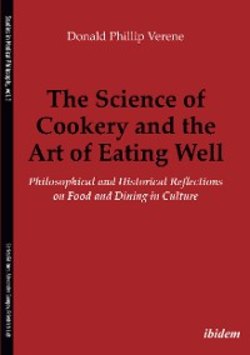Читать книгу The Science of Cookery and the Art of Eating Well - Donald Phillip Verene - Страница 7
Chapter 1 Introduction:
The Science of Cookery and the Art of Eating Well
ОглавлениеNot only does cooking mark the
transition from nature to culture,
but through it and by means of it,
the human state can be defined with
all its attributes, even those that,
like mortality, might seem to be the
most unquestionably natural.
Claude Lévi-Strauss
The Raw and the Cooked
The First Meals
In the Protagoras, Plato relates the story of Prometheus and the acquisition of fire by humans (320d–22d).1 There was a time when the gods existed but mortal beings did not. At the proper moment in the genesis of things, the gods molded the various forms of these beings inside the earth. They did this by blending earth and fire and various compounds. When the gods were ready to bring these beings into the world they put Prometheus and his brother Epimetheus in charge of assigning to each type its particular powers and abilities.
Epimetheus begged Prometheus to grant him the privilege of distributing these powers and abilities to the various species, and the agreement was made that, once the distribution was complete, Prometheus could inspect it. Thus allowed, Epimetheus supplied some with strength; those that were weaker he made quick. To some he assigned wings and to others the means to burrow underground. For protection against the weather he gave some thick pelts and hides. He shod some with hooves and gave others claws. He also provided them with various forms of nourishment. Each species was equipped with what was needed for its survival.
When Epimetheus (whose name means “he who learns only from the event, the heedless”) was finished, Prometheus (whose name means “he who knows in advance, who provides”), saw that all the available powers and abilities had been used up on the nonreasoning animals. The human race had been left entirely unequipped—naked, unshod, and unarmed—and it was already the day that all the animals, including the humans, were to be released from inside the earth into the light.
Prometheus, in order to provide the humans with some means of survival, stole fire for them from Hephaestus, the divine smith and master of the forge on Lemmos; from Athena he stole wisdom in the practical arts that was necessary for their use of fire. But he did not provide political wisdom, necessary for living together in society, for that was kept by Zeus. Humans were the only animals to command the divine power of fire and its use as a means for their existence. Also, they alone among the animals worshipped the gods.
Because human beings did not possess the art of politics, Zeus feared they might scatter and be destroyed, unable to form cities. He sent Hermes to distribute equally to all humans the virtue of justice, joined with the proper sense of shame. In Plato’s account, Zeus thus looks kindly on Prometheus’s act. But in another version, given by Cicero in the Tusculan Disputations (2.10), Zeus is greatly displeased by Prometheus’s theft of this possession of the gods. Cicero quotes from a lost play of Aeschylus in which Zeus (Jove) chains Prometheus to the Caucasus and causes an eagle (Jove’s bird) to swoop down and gnaw his liver. His liver grows back daily, only to be continually attacked for centuries, until Jove repeals the punishment.
Whether Zeus acts kindly toward Prometheus’s theft for humanity or is furiously offended, the fact remains that human animals, unlike any of the others, possess the divine power of fire, sharing ownership of this element with the gods. Possession of fire allows the human race to do four things, in addition to using it for warmth and protection. First, as claimed by Giambattista Vico, the philosopher of history, humans could set fire to the great forests that cover the earth after the universal flood, in order to accomplish the “heavy task of bringing their lands under cultivation and sowing them with grain, which roasted among the thorns and briers, they had perhaps discovered to be useful for human nourishment.”2 In so doing, these giganti, these proto-farmers, accomplish a labor of Hercules and discover the connection of fire to food.
